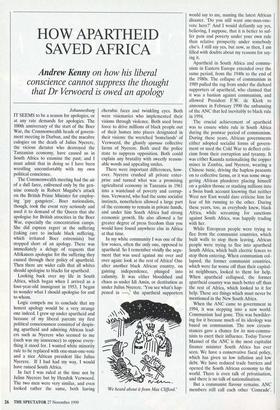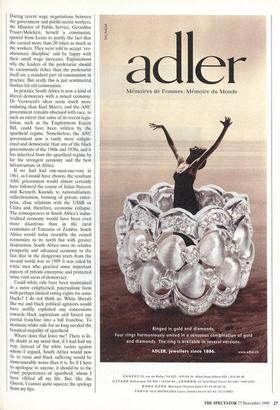HOW APARTHEID SAVED AFRICA
Andrew Kenny on how his liberal conscience cannot suppress the thought that Dr Verwoerd is owed an apology
Johannesburg IT SEEMS to be a season for apologies, or at any rate demands for apologies. The 100th anniversary of the start of the Boer War, the Commonwealth heads of govern- ment meeting in Durban, and the macabre eulogies on the death of Julius Nyerere, the vicious dictator who destroyed the Tanzanian economy, have caused us in South Africa to examine the past; and I must admit that in doing so I have been wrestling uncomfortably with my own political conscience.
The Commonwealth meeting had the air of a dull farce, enlivened only by the gen- uine comedy in Robert Mugabe's attack on the British Prime Minister for employ- ing 'gay gangsters'. Boer nationalists, though, took the event very seriously and used it to demand of the Queen that she apologise for British atrocities in the Boer War, especially the concentration camps. She did express regret at the suffering (taking care to include black suffering, which irritated Boer extremists) but stopped short of an apology. There was immediately a deluge of requests that Afrikaners apologise for the suffering they caused through their policy of apartheid. Then there are wider calls that all whites should apologise to blacks for apartheid.
Looking back over my life in South Africa, which began when I arrived as a four-year-old immigrant in 1953, I began to wonder what I should apologise for and to whom.
Logic compels me to conclude that my honest apology would be a very strange one indeed. I grew up under apartheid and because of my liberal parents my first political consciousness consisted of despis- ing apartheid and admiring African lead- ers such as Nyerere who seemed to me (such was my innocence) to oppose every- thing it stood for. I wanted white minority rule to be replaced with one-man-one-vote and a nice African president like Julius Nyerere. If I had had my way, I would have ruined South Africa.
In fact I was ruled at the time not by Julius Nyerere but by Hendrik Verwoerd. The two men were very similar, and even looked rather the same, both having
cherubic faces and twinkling eyes. Both were visionaries who implemented their visions through violence. Both used brute force to drive millions of black people out of their homes into places designated in their visions: the wretched 'homelands' of Verwoerd, the ghastly ujamaa collective farms of Nyerere. Both used the police state to suppress opposition. Both could explain any brutality with sweetly reason- able words and appealing smiles.
There were important differences, how- ever. Nyerere crushed all private enter- prise and turned what was a promising agricultural economy in Tanzania in 1961 into a wasteland of poverty and corrup- tion. Verwoerd, who had the same socialist instincts, nonetheless allowed a large part of the economy to remain in private hands, and under him South Africa had strong economic growth. He also allowed a far greater degree of press freedom than you would have found anywhere else in Africa at that time.
In my white community I was one of the few voices, often the only one, opposed to apartheid. So I remember vividly the argu- ment that was used against me over and over again: look at the rest of Africa! One after another black African country, on gaining independence, plunged into calamity. It was either bloodshed and chaos as under Idi Amin, or destitution as under Julius Nyerere. 'You see what's hap- pened in —,' the apartheid supporters
We heard about it from Max Clifford.'
would say to me, naming the latest African disaster. `Do you still want one-man-one- vote here?' And I would defiantly say yes, believing, I suppose, that it is better to suf- fer pain and poverty under your own rule than relative prosperity under somebody else's. I still say yes, but now, as then, I am filled with doubts about my reasons for say- ing it.
Apartheid in South Africa and commu- nism in Eastern Europe extended over the
same period, from the .1940s to the end of the 1980s. The collapse of communism in
1989 pulled the rug from under the diehard
supporters of apartheid, who claimed that it was a bastion against communism, and
allowed President F.W. de Klerk to announce in February 1990 the unbanning of the ANC that led inevitably to black rule in 1994.
The crucial achievement of apartheid was to ensure white rule in South Africa during the postwar period of communism.
During these years, African governments either adopted socialist forms of govern- ment or used the Cold War to deflect criti- cism from their corruption and tyranny. It was either Kaunda nationalising the copper mines in Zambia, and Nyerere, wearing a Chinese tunic, driving the hapless peasants on to collective farms, or it was some swag- gering African plunderer placing himself on a golden throne or stashing millions into a Swiss bank account knowing that neither West nor East would dare criticise him for fear of his running to the other. During these years, too, as everybody knew, black Africa, while screaming for sanctions against South Africa, was happily trading with her.
While European people were trying to flee from the communist countries, which built walls to stop them leaving, African people were trying to flee into apartheid South Africa, which built electric fences to stop them entering. When communism col- lapsed, the former communist countries, which were far worse off than their capital- ist neighbours, looked to them for help.
When apartheid collapsed, the former apartheid country was much better off than the rest of Africa, which looked to it for help. These are things which must never be mentioned in the New South Africa.
When the ANC came to government in 1994, it was stepping into a new world.
Communism had gone. This was bewilder- ing for it because much of its ideology was based on communism. The new circum- stances gave a chance for its non-commu- nists to exert their influence. Today Trevor Manuel of the ANC is the most capitalist finance minister South Africa has ever seen. We have a conservative fiscal policy, which has given us low inflation and low debt. We have reduced trade barriers and opened the South African economy to the world. There is even talk of privatisation, and there is no talk of nationalisation.
But a communist flavour remains. ANC members still call each other 'Comrade'. During recent wage negotiations between the government and public-sector workers, the Minister of Public Service, Geraldine Fraser-Moleketi, herself a communist, quoted from Lenin to justify the fact that she earned more than 20 times as much as the workers. They were told to accept 'rev- olutionary discipline' and be happy with their small wage increases. Explanations why the leaders of the proletariat should be enormously richer than the proletariat itself are a standard part of communism in practice. But really this is just sentimental blather for old communists.
In practice South Africa is now a kind of liberal democracy with a mixed economy.
Dr Verwoerd's ideas seem much more enduring than Karl Marx's, and the ANC government remains obsessed with race, to such an extent that some of its recent legis- lation, such as the Employment Equity Bill, could have been written by the apartheid regime. Nonetheless, the ANC government now is vastly more enlight- ened and democratic than any of the black governments of the 1960s and 1970s, and it has inherited from the apartheid regime by far the strongest economy and the best infrastructure in Africa.
If we had had one-man-one-vote in 1961, as I would have chosen, the resultant ANC government would almost certainly have followed the course of Julius Nyerere and Kenneth Kaunda to nationalisation, collectivisation, banning of private enter- prise, close relations with the USSR or China and, therefore, economic collapse.
The consequences in South Africa's indus- trialised economy would have been even more disastrous than in the rural economies of Tanzania or Zambia. South Africa would today resemble the ruined economies to its north but with greater destruction. South Africa owes its relative prosperity and advanced economy to the fact that in the dangerous years from the second world war to 1989 it was ruled by white men who guarded some important aspects of private enterprise and protected some vital areas of democracy.
Could white rule have been maintained in a more enlightened, paternalistic form with perhaps limited voting rights for some blacks? I do not think so. White liberals like me and black political agitators would have swiftly exploited any concessions towards black aspirations and forced any partial franchise into a full franchise. To maintain white rule for so long needed the fanatical stupidity of apartheid.
Where does that leave me? There is lit- tle doubt in my mind that, if I had had my Way, instead of the white racists against whom I argued, South Africa would now lie in ruins and black suffering would be immeasurably worse than it is. So if I have to apologise to anyone, it should be to the cruel perpetrators of apartheid, whom I
have vilified all my life. But, like the Queen, I cannot quite squeeze the apology from my lips.



























































































 Previous page
Previous page